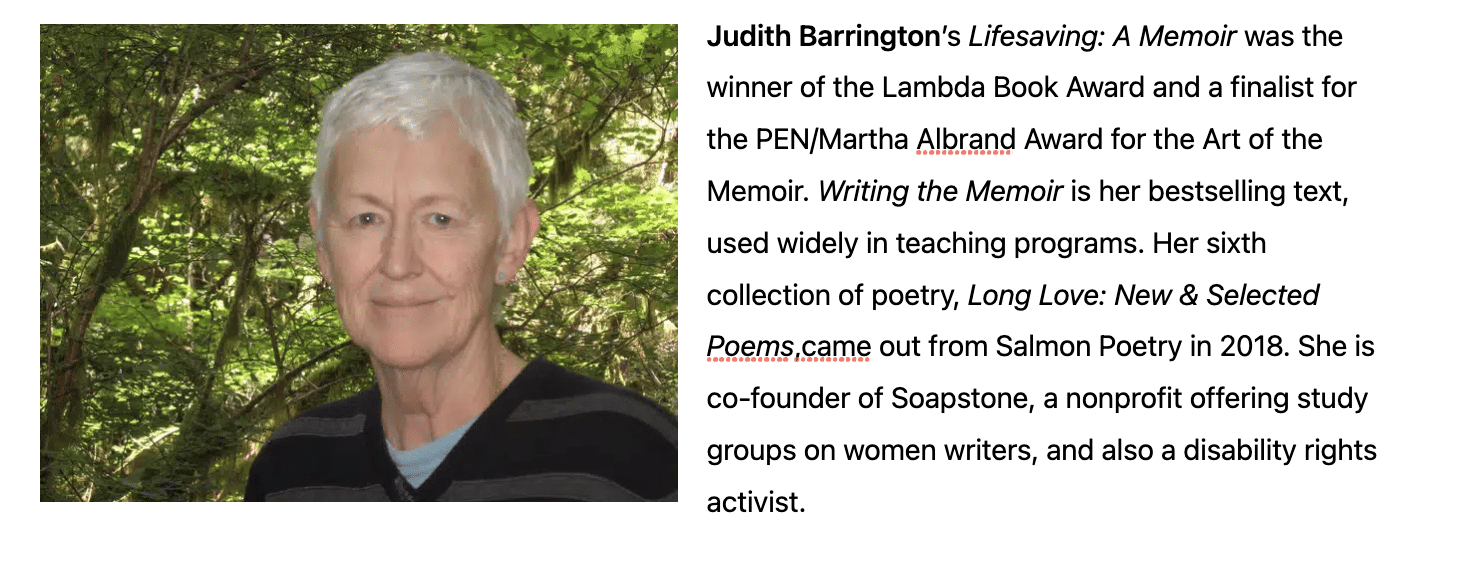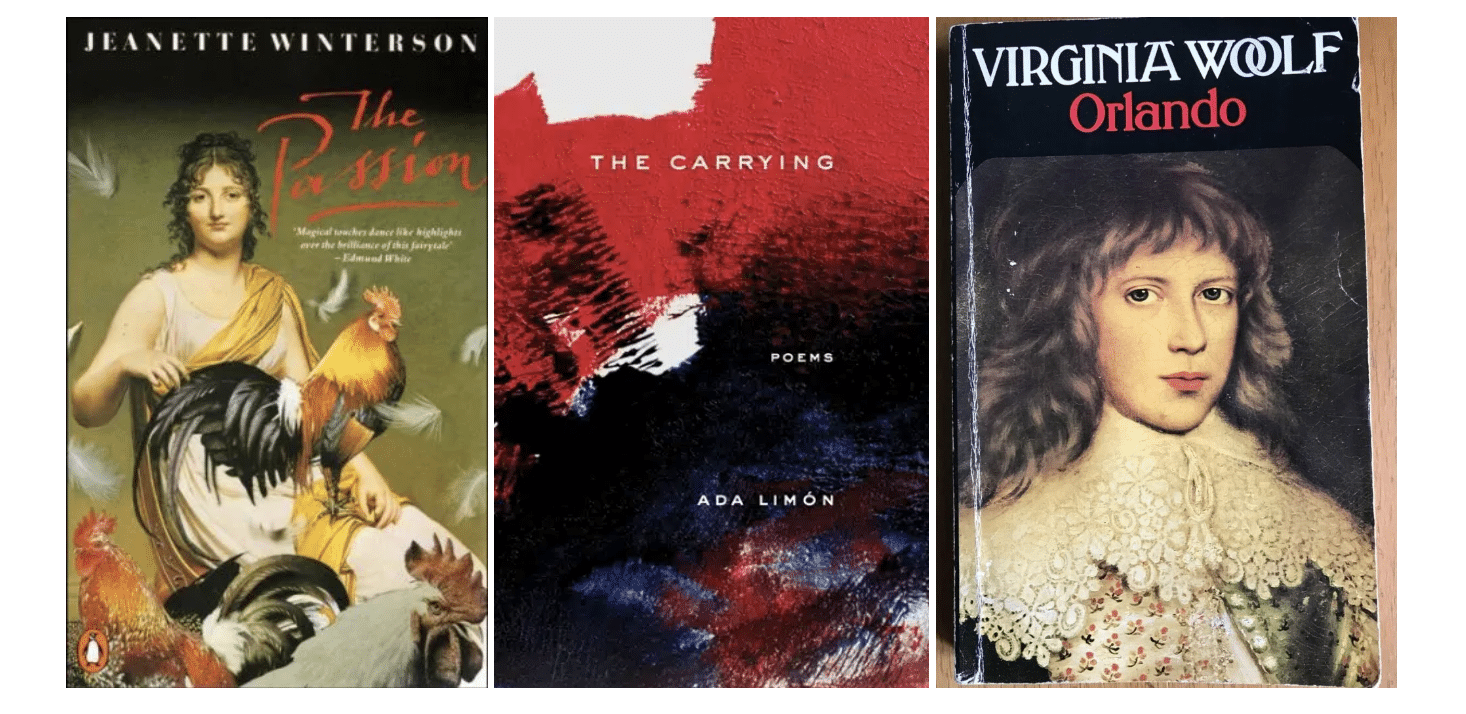We’re thrilled to introduce the 2023 Oregon Literary Fellowship recipients with individual features on our blog! Out-of-state judges spent several months evaluating the 500+ applications we received, and selected 13 writers and two publishers to receive grants of $3,500 each. Literary Arts also awarded two Oregon Literary Career Fellowships of $10,000 each. Applications for the 2024 Literary Fellowships close on August 4th, 2023.

Q&A with Literary Arts
Who are some writers you look up to or who move you to write?
Virginia Woolf, Adrienne Rich, Ada Limon, A.S. Byatt, Janice Gould, Lucille Clifton, Paul Monette, Seamus Heaney, Gertrude Stein, Sylvia Plath, Tony Kushner.
What are your sources of inspiration? Of joy?
Dogs, Horses, Mediterranean Sea, Underwater seascapes, Gorillas, Catalunya, Aigua Blava, Sussex Downs.
How would you describe your creative process?
I believe in the “composting” part of creating that Susan Griffin described so well – the part that looks as if I am doing nothing! That time now is able to take more time as I have less “other”work to do than I used to have when I was teaching and working for money.
I tend to write with the waxing of the moon.
What is most exciting about receiving a fellowship?
Being reminded that I am still part of the writing community that has supported me for some forty years, and to which I have contributed regularly.
What are you currently working on?
A collection of thirteen short, linked memoirs with a focus on my life as a lesbian-feminist writer.
What has kept you writing?
Love of words.
What advice do you have for future applicants?
Don’t count on it, but dream of success. Be grateful.
Any book (or movie, album, show, etc.) recommendations?

- All the published books of poet, Ada Limón, current poet laureate of the USA.
- All the recent anthologies by disabled writers you can find.
- “Orlando” by Virginia Woolf.
- “Angels in America” by Tony Kushner, TV Mini series, or live on stage
- “The Force of Gratitude” by Janice Gould.
- “The Passion” by Jeannette Winterson
Excerpt from Imagine
I struggled to keep pace with my own rapid changes: my appearance, my allegiances, and most of my beliefs, to say nothing of a whole new set of friends. Trying to make up for years of obliviousness, I questioned everything: how my boss at BBC Television, (a man who barely needed one secretary) had expected me, the junior one, only to look good and feed the goldfish; my father whose word had been law and the ways in which my mother worked around that (“let him think it was his idea”); the absence of women—except for queens and the occasional wife—in the history books I’d read at school. And how could I not have noticed the bruises under the powder layered on the cheekbone of that woman at Tesco’s who’d argued with the checkout clerk and threatened to give her whining toddler something to cry about?
I was jolted daily, sometimes even hourly, by insights that have since become commonplace, as new ways of understanding the world always do in the end. Trying to make sense of it all, I wrote copiously in notebooks, scrawling quotations from the theorists: Juliet Mitchell, Kate Millet, Eva Figes, and the poets: Alta, Robin Morgan and Astra. Often I would pull my car over after a meeting and stop to write down a thought. At night I sat up in bed making notes, or woke up before dawn to record a dream. It was as if a door had opened where I’d never even known a door existed; I’d walked through it and entered a landscape that looked familiar at first—but the light was different, the geographical features out of place, and the weather much more unpredictable.
My familiar drive to work had been transformed. Streatham High Street was filled with women who, at any moment, might chuck away their string bags, vegetables scattering hither and thither, and link arms as if they were in a Bollywood movie, with revolution breaking out all around them. Brixton, which had always felt rather foreign, hovering for several years on the verge of race riots, no longer scared me; I recognized the urgency among the stalls of its street market.
Like most new converts to anything, I was extreme. For the moment, sexism explained everything: my father, Colin, all the ex-boyfriends, became part of a male world which had wronged me and all women. While much of the theory would hold up over time and I would remain a committed feminist, I would sooner or later have to grapple with complexities not apparent during those heady first months.
I moved out from Lydia’s and sublet a flat in Pimlico where I could live alone. Next to the toilet, I tacked up typewritten copies of my favorite poems, several of which were by Susan Griffin whose first book we passed from hand to hand, increasingly dog-eared and coffee-ringed. Lilian discovered that I was writing poems and suggested we put together another group, this one for writers. We found seven poets and named ourselves The Literature Collective. Now I had two weekly meetings, a monthly meeting at Shaver’s Place, and numerous speak-outs, conferences, and events with titles like “Women in History” or “Women and Psychiatry”—all beset by ideological confrontations.
Judge’s Comments
“Judith Barrington is a master of scene-setting. Her new project is filled in with memory charged with emotion and biting critique of the ways dominant culture determines (and forecloses) relational possibilities. THE WALK HOME is a chance to make right the ways our younger selves have been in service to the invisibility of others whose lives have helped us imagine our own disabled futures across the page like the dream of freedom. A fierce and complex meditation on the ways in which one encounters both the delicacies and hardiness of difference. . “
-Raquel Gutiérrez


